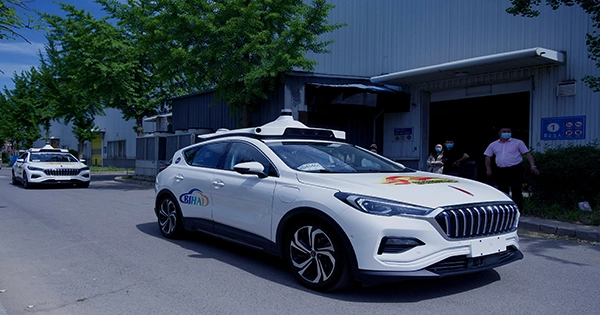According to both firms, Baidu, a Chinese internet behemoth, and Pony.ai, an autonomous vehicle company, have secured licences to operate driverless ride-hailing services to the public on open roads in Beijing. Several cities in China have permitted autonomous vehicle firms to test self-driving vehicles without a human safety operator in the driver’s seat, but this is the first time a fully driverless service is authorized. However, because the permission requires the firms to have a safety operator in the front passenger seat, the law is not as mature as, example, California’s driverless permits, which require no human in the car other than the passenger.
According to a Baidu spokesperson, neither Pony nor Baidu will charge a fee for driverless rides at this time, though both companies are currently operating commercial services with drivered robotaxis in Yizhuang, Beijing, also known as the Beijing High-level Automated Driving Demonstration Area (BJHAD). Both Baidu’s and Pony’s driverless services will operate in this 60-square-kilometer section of Beijing, which is home to around 300,000 people. Pony just received a taxi license in Guangzhou to operate and charge for autonomous ride-hailing, which requires a safety operator to remain in the driver’s seat.
Many AV businesses are based in China, and it’s evident from both Baidu’s and Pony’s milestones that the country is pressing forward with legislation in order to bring autonomous technology to market. The licences obtained by BJHAD’s central office allow Baidu to deploy 10 driverless vehicles in Beijing beginning Thursday, joining the company’s current Apollo Go fleet of roughly 100 cars in the capital city. “At a later point,” the business said it wants to add 30 more self-driving cars.
Pony’s service will launch on Thursday with four self-driving cars, but the business plans to expand in the future. Customers of Apollo Go may hail a ride using the app from 10 a.m. to 4 p.m., while Pony customers can hail a ride using the PonyPilot+ app from 9 a.m. to 5 p.m. According to Pony, the region would include hundreds of pickup and drop-off points, including metro stations, parks, stadiums, core business districts, and residential neighborhoods.
Pony.ai, an autonomous vehicle company, has been granted permission to operate 100 robotaxis as traditional taxis in Guangzhou. Pony’s new license, which permits it to charge for rides in its self-driving vehicles, is another step toward commercializing autonomous ride-hailing vehicles in China. WeRide, one of Pony’s Chinese competitors, has been partnering with Guangzhou’s government-backed cab business Baiyun since 2019, giving the company an early mover advantage on the way to commercialization.
However, this is reported to be the first time China has issued a taxi license just for autonomous ride-hailing vehicles, eliminating the necessity for a traditional taxi operator. Pony’s fleets are also subject to the same standards that apply to typical human-operated taxis under the license.
















